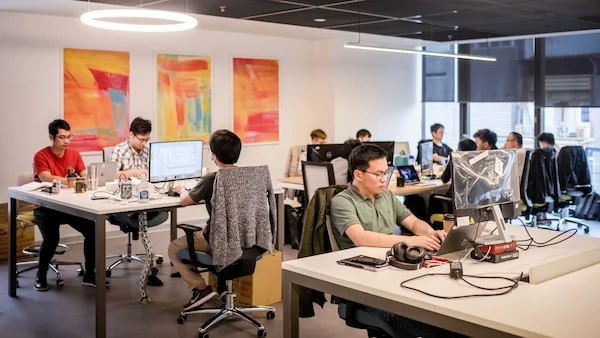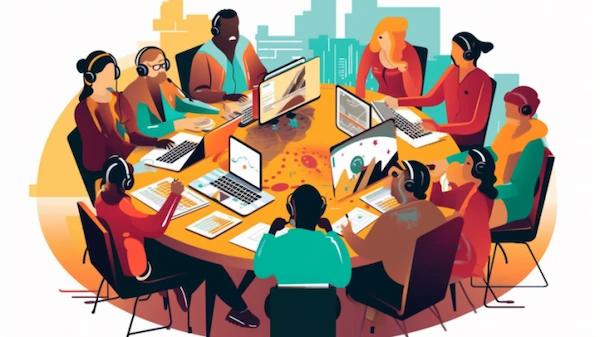Work Culture in Vietnam for International Workers

Vietnam has become an attractive destination for international workers due to its rapid economic growth and friendly work environment. However, to integrate and work effectively in Vietnam, foreign employees need to understand the unique work culture of this country.
Sense of Community and Cohesion

Sense of community is one of the most prominent features of the work culture in Vietnam. Vietnamese people value harmony and cohesion in relationships, including colleague relationships. They often build close relationships, share, and support each other in work and life.
This means that international workers need to actively participate in group activities, such as:
- Having lunch with colleagues
- Joining in celebrations and parties
- Engaging in conversations and personal sharing
By doing so, you will quickly become part of the team and receive enthusiastic support from your Vietnamese colleagues.
Respect for Hierarchy and Age
In Vietnamese culture, respect for hierarchy and age plays an important role. Younger employees often show respect and listen to the opinions of their superiors and older colleagues. Arguing or directly contradicting the opinions of superiors may be considered disrespectful.
When working in Vietnam, international workers should:
- Use appropriate pronouns such as “anh/chị” (older brother/sister) with older colleagues
- Listen and consider the opinions of superiors before expressing personal opinions
- Avoid heated arguments or directly contradicting the opinions of superiors
By showing respect, you will easily build good relationships with colleagues and superiors in the workplace.
Indirect Communication and Saving Face

Vietnamese people often use indirect communication styles to avoid conflicts and save face for others. They rarely say “no” directly and often use phrases like “maybe”, “let me review”, or “we will consider” to express rejection.
In addition, saving face is also very important in the work culture in Vietnam. Criticizing or embarrassing others in public can be hurtful and negatively affect work relationships.
When communicating in the work environment in Vietnam, international workers should:
- Pay attention to body language and tone when communicating
- Use compliments and encouragement to motivate colleagues
- Avoid criticizing or embarrassing others in public
- Show empathy and respect when giving feedback
By applying appropriate communication styles, you will build good and effective work relationships with your Vietnamese colleagues.
Flexibility and Multitasking

Flexibility is another prominent feature of the Vietnamese work culture. They are often willing to adapt to changes and adjust plans when necessary. Being too rigid in adhering to rules and plans can create difficulties in collaboration.
In addition, the ability to multitask is also highly valued in the work environment in Vietnam. Employees are often expected to handle multiple tasks simultaneously and flexibly switch between different tasks.
To work effectively in this environment, international workers should:
- Show willingness to adapt to changes
- Be flexible in adjusting plans when necessary
- Develop multitasking skills and manage time effectively
- Be ready to support colleagues when they need help
By demonstrating flexibility and multitasking abilities, you will easily integrate and contribute effectively to the work environment in Vietnam.
Building Personal Relationships
In the work culture in Vietnam, building personal relationships plays an important role in promoting cooperation and success at work. Vietnamese people often spend time getting to know and building close relationships with colleagues, partners, and customers.
This may include:
- Participating in social activities, such as lunch, coffee, or social events
- Sharing information about family, hobbies, and personal life
- Showing concern and support in both work and life
By investing time and effort in building personal relationships, you will establish long-lasting trust and support in the work environment in Vietnam.
Conclusion
Working in Vietnam is an exciting and rewarding experience for international workers. By understanding and adapting to the unique work culture of this country, you will have the opportunity to develop your career, expand your network, and explore a diverse culture.
If you are looking for job opportunities in Vietnam, visit Jobinvietnam.net – the leading recruitment platform for international workers. With a team of enthusiastic and experienced consultants, Jobinvietnam.net will support you in finding suitable jobs and provide useful information about the work culture in Vietnam.
Contact Jobinvietnam.net today via phone, Zalo, or WhatsApp to receive the most detailed and accurate advice. We are ready to accompany you on your journey to conquer your career in Vietnam!


